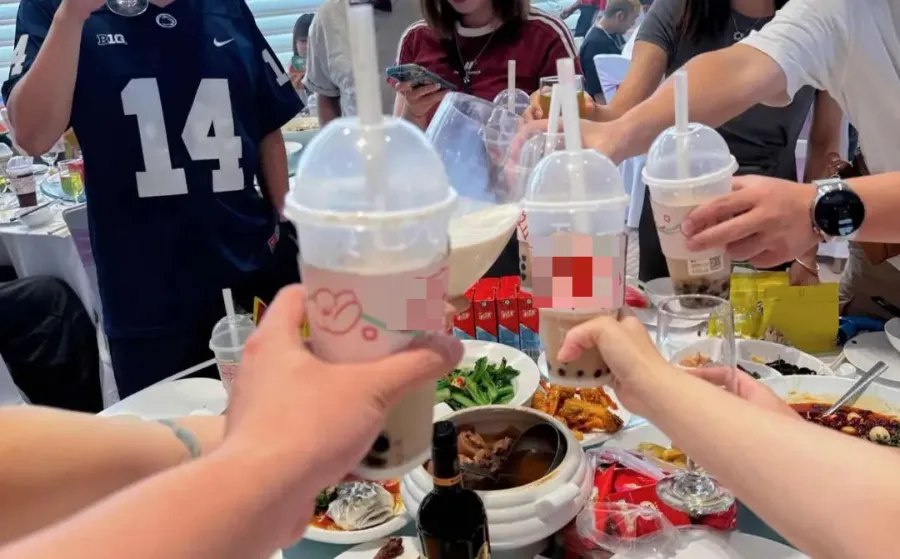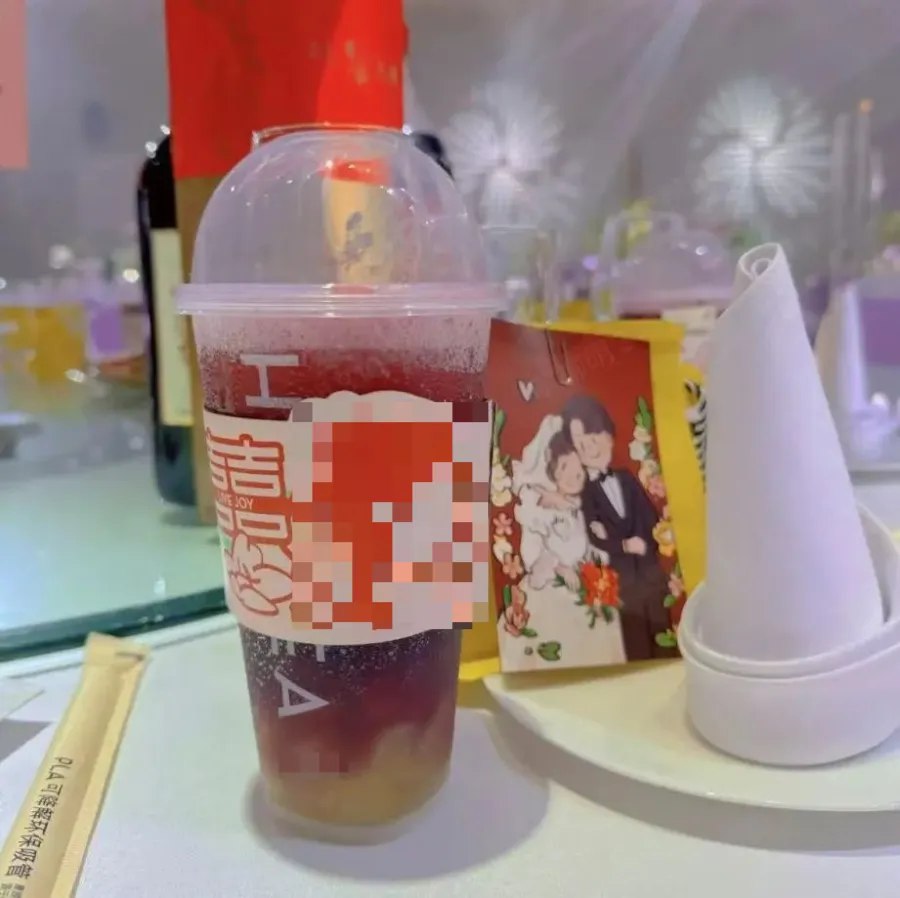




- BRNN
- BRI News
- BRNN News
- Database
Official Documents Polices and Regulations
Inter-government Documents International Cooperation BRI Countries
Business Guide Economic Data BRI Data
Trade
Investment Projects Latest projects
Cases - Content Pool
Young people in China are replacing traditional alcoholic beverages with new Chinese-style tea beverages, including milk tea, bubble tea, and fruit tea, at their weddings.
The emerging wedding trend is making waves on social media platforms in the country, with videos and posts showing young couples drinking a toast to their family and friends with giant cups of milk tea at their wedding banquets frequently seen among trending topics on online platforms.
In the comment sections of these posts and videos, many people shared their reasons for choosing new-style tea beverages over alcohol. The most common reasons cited include the "tradition of replacing alcohol with tea during toasts when drinking is inadvisable or inconvenient," the "festive packaging of new-style tea drinks," and the desire to "avoid drunken mishaps."

A post-90s couple in Nanning, capital of south China's Guangxi Zhuang Autonomous Region, raises a toast with guests with new Chinese-style tea drinks at their wedding. (Photo courtesy of the interviewees)
In addition, some couples are opting for new-style tea beverages instead of traditional alcoholic drinks at weddings in an effort to cater to health-conscious guests and offer more inclusive options for those who prefer non-alcoholic drinks.
Xu Jiaping, a post-95s bride-to-be, told the media that she plans to serve Chinese-style tea beverages alongside Baijiu (Chinese liquor) and red wine at her wedding. This approach is meant to honor the preference of her elders while showing the distinctive lifestyle of young people.
Compared to traditional sugary sodas or alcohol, tea beverages offer a thoughtful alternative for those who do not drink or are mindful of their sugar intake, according to Xu.
Some Chinese-style tea brands have recognized the demand and are now offering customized wedding packages, complete with branded packaging and even on-site tea stalls.
A post-90s couple who got married in October 2024 in Nanning city, capital of south China's Guangxi Zhuang Autonomous Region, ordered 320 cups of new Chinese-style tea drinks to replace traditional alcoholic beverages.
They also had the wedding venue decorations custom-designed by the same tea beverage brand to match the overall theme of the event, according to an executive from the tea beverage brand.

Photo shows a part of the wedding venue of a couple in China. (Photo courtesy of the interviewees)
In fact, this trend is not limited to weddings. Young people in China are increasingly choosing tea over alcohol for other events, such as graduation and corporate banquets, signaling that new-style tea beverages are becoming essential drinks at celebratory occasions.
Preparing dozens or even hundreds of cups of milk tea in the reception area or next to the sign-in table is becoming an increasingly common request, said Chen Yao, a wedding planner and corporate team building activity planner in China.
"Many of our clients now request milk tea stalls at their events, allowing guests to customize their drinks on the spot," she added.
Some tea brands pay special attention to packaging, according to Chen. The packaging of tea beverages, featuring classic patterns, exquisite designs, and festive colors, blends seamlessly with the atmosphere of ceremonial occasions and adds a touch of Eastern elegance to the venue, she noted.
Responding to the rising demand for "milk tea at weddings", a tea beverage chain brand has launched a special catering service for wedding banquets since 2022, offering discounted group meal packages along with free wedding packaging, delivery, and setup services.
The service has gained widespread attention, receiving orders from consumers in 100 cities across the country.
Another tea beverage company that added a group meal reservation feature to its mini-program in May 2024 has provided approximately 1.5 million cups of modern tea beverages for events including weddings, social gatherings, and workplace celebrations between January and September.
During the 2024 National Day holiday, group orders at the tea beverage company saw a nearly 300-percent increase year on year, said an executive of the public relations department of the company.
"The entry of new Chinese-style tea beverages into the wedding market is actually the result of a further expansion of the consumption scenario for such beverages, or we could say it marks a shift to a full-scenario stage," said Zhu Danpeng, a food industry analyst in China.
For today's consumers, new-style tea drinks have almost become a "necessity," and many businesses have keenly recognized this trend, Zhu said.
"Replacing alcohol with new tea beverages is, in fact, an innovative way to reinterpret traditional wedding rituals. New Chinese-style tea drinks reflect the fashion-forward and culturally confident mindset of young people, and are more interactive, making them ideal for sharing and spreading on social media platforms," said Wang Xue, a teacher from the department of marketing at Renmin Business School, Renmin University of China.
Compared to the traditional alcohol culture, new Chinese-style tea beverages are more aligned with the lifestyle of young people, Wang pointed out.
"Quality and brand are the most important factors affecting consumers' choice," Zhu Danpeng said.
New Chinese-style tea beverages have entered a more competitive stage in 2024, Zhu noted, adding that the stability of quality, innovation in consumption scenarios, upgrading of service systems, and customer loyalty determine the future direction of relevant brands.

Tel:86-10-65363107, 86-10-65368220, 86-10-65363106